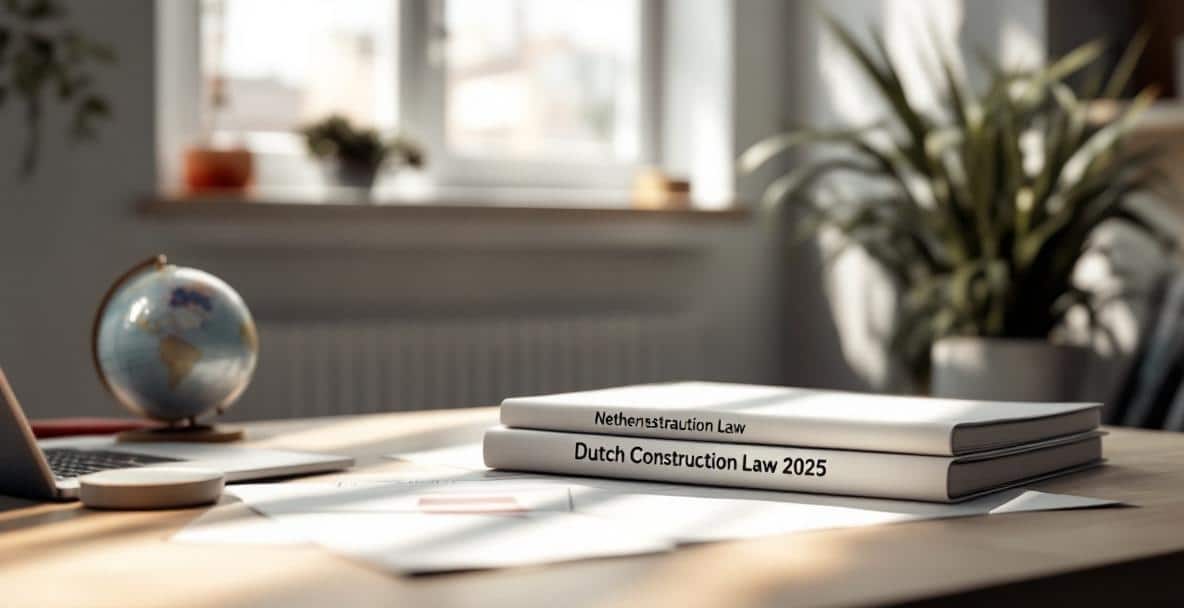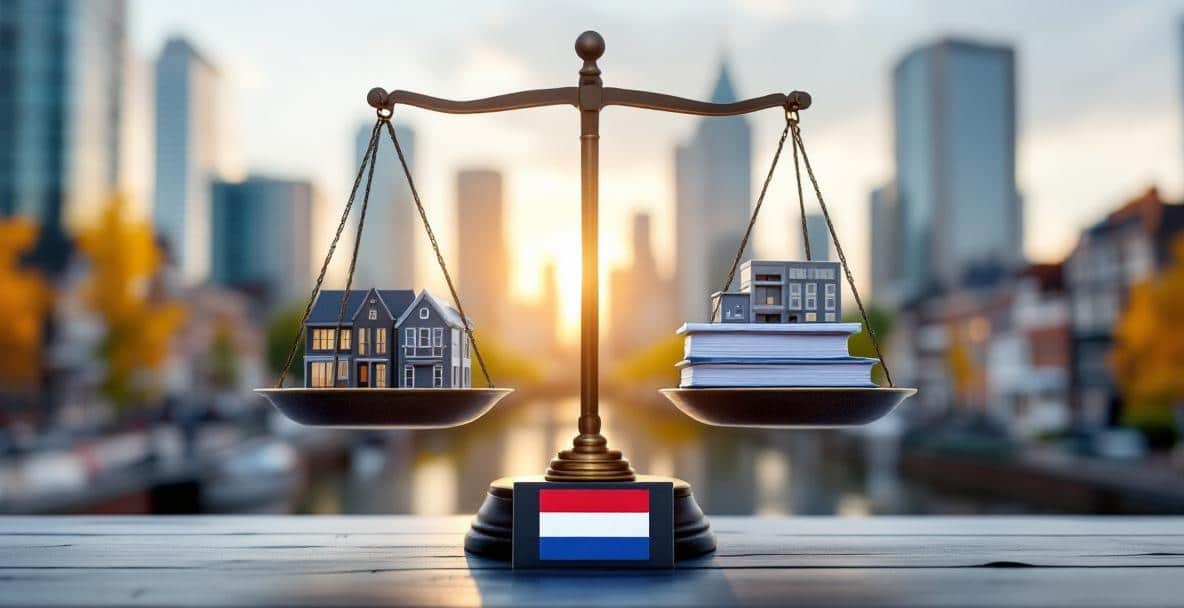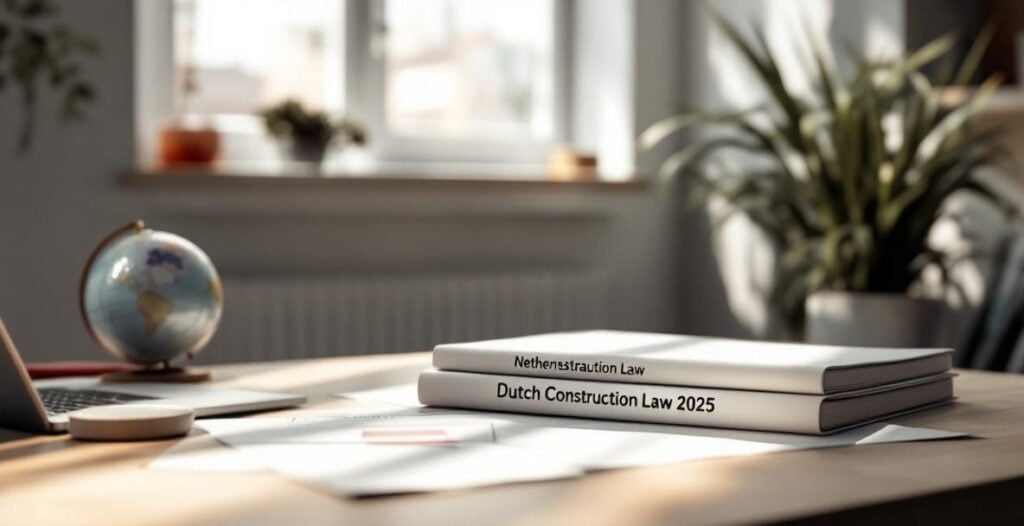Picture your project coming to a sudden stop over one missed permit or rule. That unexpected hiccup can cost time and money. Expert legal advice from Law & More B.V. has turned potential disasters into smooth operations. We know the challenges and are here to share insights that help you steer through Dutch construction law confidently.
Why Knowing Dutch Building Rules Can Save You a Headache

What Makes It So Tricky
Building projects in the Netherlands come with a maze of permits, local rules, and legal twists that can overwhelm even seasoned developers. The Dutch system mixes national laws with varied local mandates that differ from one province to another and even between municipalities. One small oversight can lead to major legal challenges. For clients from abroad, language differences and rules that strongly favor sustainability and community interests add extra layers of complexity.
Keeping Up With New Rules
The legal framework here shifts quickly as housing pressures, climate concerns, and new technologies push for change. In 2025, expect stricter environmental standards, fresh zoning rules, and digital permit processes that demand faster adaptation. Falling behind on these changes may cause project delays, unexpected costs, or disputes that proper planning could have prevented. Keeping current with these updates is not just smart-it can be the key to keeping your project on track.
What Every Builder Must Understand About Dutch Construction Law

How to Secure Permits and Follow the Rules
Every construction project starts with the right permits. Since January 2024, the Environmental and Planning Act (Omgevingswet) has combined many old rules into one streamlined system. This new act simplifies the permit process but introduces fresh requirements. You need an all-in-one environmental permit that covers construction activities, environmental impact, and even heritage concerns if your site is near protected buildings. The digital application process asks for more detailed information upfront, but it also offers a clearer view of your progress. Local officials still hold considerable power in interpreting these rules, so reaching out early is a smart move.
A rising issue is the strict control of nitrogen emissions following recent court rulings. If your project lies near protected nature areas, you must prove that its impact is minimal. Detailed environmental assessments now demand specialized know-how. Navigating these tough guidelines is crucial for keeping your permit on track.
Making Sense of Your Contracts
Dutch construction contracts have some unique twists that often catch international clients by surprise. Standard forms such as the Uniform Administrative Conditions for the Execution of Works (UAV 2012) and for Integrated Contracts (UAV-GC 2005) are commonly used and well understood by local courts. Since 2024, contracts have become more explicit about sharing risks like supply chain disruptions, material price changes, and meeting sustainability benchmarks. Clear language on delay, force majeure, and dispute resolution is now vital. The Dutch legal culture values reasonableness and fairness, allowing courts to adjust terms when necessary to maintain balance.
Collaborative contract models are also on the rise. These newer agreements distribute risks and benefits more evenly among everyone involved in a project. Understanding how these contracts work under Dutch law can be the key to keeping your project moving forward without unexpected bumps.
Keeping Everyone Safe on the Job
Worker safety rules in the Dutch construction sector have become even more stringent. Laws such as the Working Conditions Act and the Construction Site Safety Decree now place greater responsibility on developers and main contractors, including oversight of subcontractors. Digital monitoring and thorough record-keeping of safety measures are now standard practice. Contractors must appoint qualified safety coordinators, and penalties for missing the mark have grown. This is especially important for foreign firms used to different standards.
Modern health and safety rules have expanded to cover not just jobsite safety but also environmental impacts on local communities. Measures to cut noise, dust, and other disturbances now factor into your permit conditions. Ensuring strict adherence to these guidelines is essential for avoiding work stoppages and protecting everyone involved.
Steering Clear of Costly Legal Headaches

Common Slip-Ups to Avoid
Even experienced builders can hit legal snags. A common mistake is not digging deeply enough into local zoning rules. The Dutch zoning system is very precise, so your project must fit exactly within permitted uses. In busy urban areas, strict historical preservation rules may limit what you can do, even if they aren’t obvious from property records. Neighbors have strong rights in the Netherlands; complaints about privacy, light, or views can drag out delays or force changes. Additionally, miscommunication in contracts often leads to confusion, as the Dutch system values good faith and practical problem-solving over rigid, literal terms.
How to Shield Your Project From Legal Headaches
Getting ahead of problems is always more cost-effective than fixing them later. Start by doing your homework before buying land or finalizing design plans. Verify local zoning rules, check for any environmental issues, and research historical requirements that might affect your site. Early conversations with local officials can reveal hidden obstacles so you can adjust plans before submitting any applications. This kind of proactive planning usually saves time and money down the line.
Keeping detailed records is just as important. Document every conversation, decision, and the state of the site before work kicks off. These records may protect you if neighbors or others raise legal challenges later. Solid documentation is one of the best tools you have in a tricky legal environment.
Staying One Step Ahead
Plan ahead at every stage of your project. At Law & More, we suggest setting up a calendar to keep track of permit renewals, inspection dates, and other critical deadlines. This kind of forward-thinking can help you avoid surprises and show regulators that you are serious about compliance.
It also helps to focus on managing risks in your contracts. While standard contracts provide a starting point, customize them to handle project-specific issues like delays and fluctuating material costs. Building strong relationships with local officials by having a consistent point of contact can ease many challenges. Strong connections can turn potential hurdles into manageable issues through open communication.
Working With a Trusted Legal Partner

How to Pick a Great Legal Partner
When it comes to navigating Dutch construction law, choosing the right legal partner is essential. Look for a team that not only understands the law but also knows the practical side of construction. At Law & More, our multilingual experts bring real-world experience to every project. Ask about their track record with projects similar in scale and complexity to yours. Ensure they can offer practical problem-solving and clear, actionable advice.
Getting the Most from Your Legal Team
It pays to involve your legal experts from the very start. By joining your initial planning sessions, they can help spot potential issues before they turn into major problems. Their early input can shape your project in a way that minimizes legal risks and keeps budgets in check. Law & More goes beyond just reviewing documents, offering guidance on how the permits and regulations directly affect your build. This early collaboration is especially valuable if you’re new to Dutch building practices.
When conflicts arise, having your legal team in the loop can help resolve issues quickly and amicably. Their familiarity with your project can lead to solutions that avoid long, costly disputes, keeping your project moving forward with minimal interruption.
Wrap-Up: Build Your Project on Firm Ground
Main Points to Remember
Tackling Dutch construction law means blending careful research, forward planning, and expert advice. The rules here keep changing, especially with a focus on the environment, technology, and community needs. Being proactive with legal support transforms potential delays into smooth progress. Contracts must be clear and fair, and safety isn’t just about protecting workers but also about caring for the community. Keep thorough records, communicate clearly, and make informed decisions at every turn.
What to Do Next
Before starting your next project, get your plans reviewed by an experienced legal team. Understand the local rules where your project stands and track every important deadline. Early legal review and meticulous documentation can save you from future headaches.
Need expert guidance for your Dutch construction project? At Law & More B.V., we specialize in helping both local and international clients navigate the complexities of Dutch construction law. Our multilingual team offers personalized service and practical solutions tailored to your specific project needs. Contact us today to schedule a consultation and build your project on a solid legal foundation.
